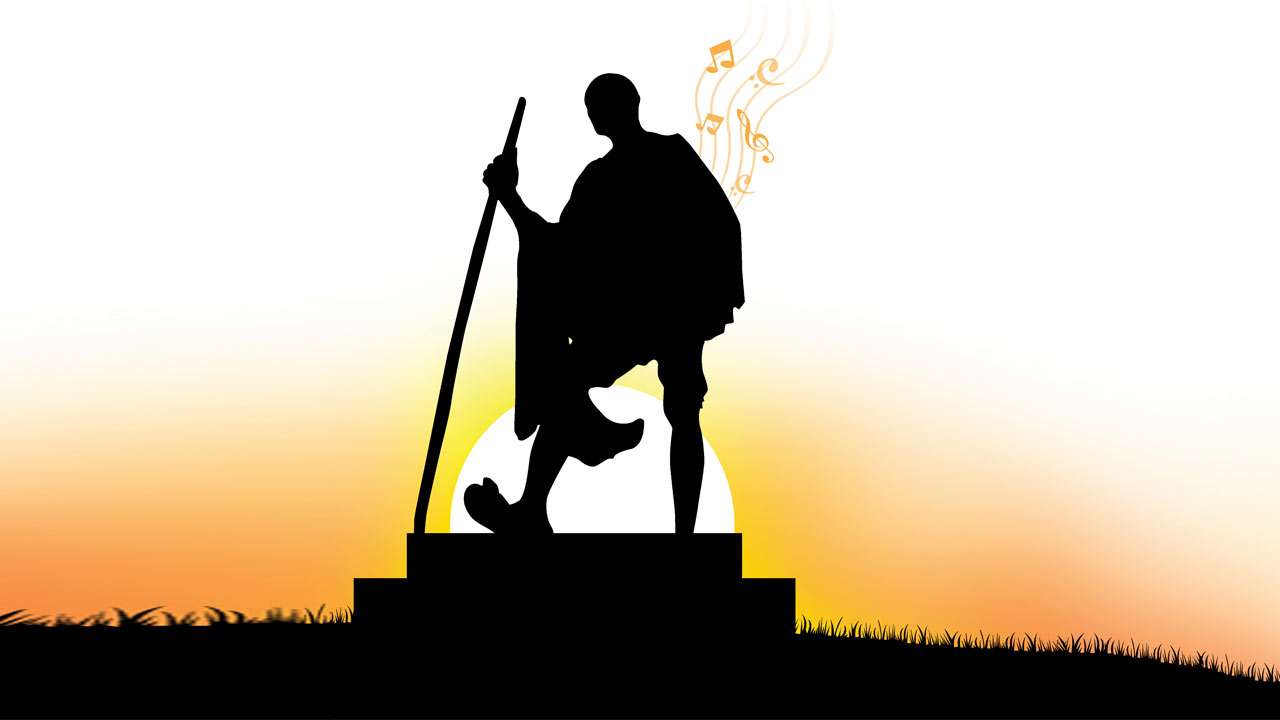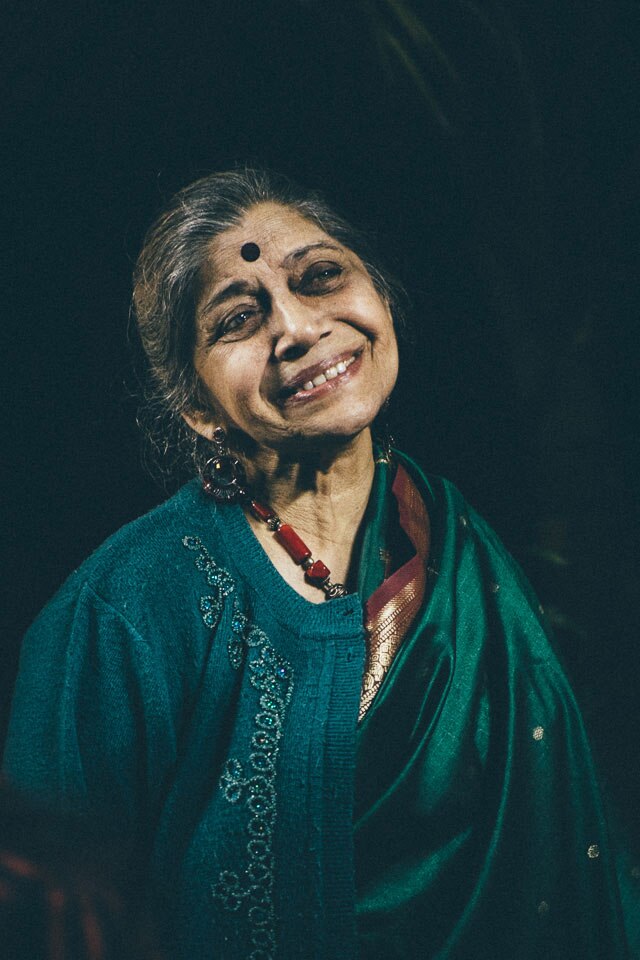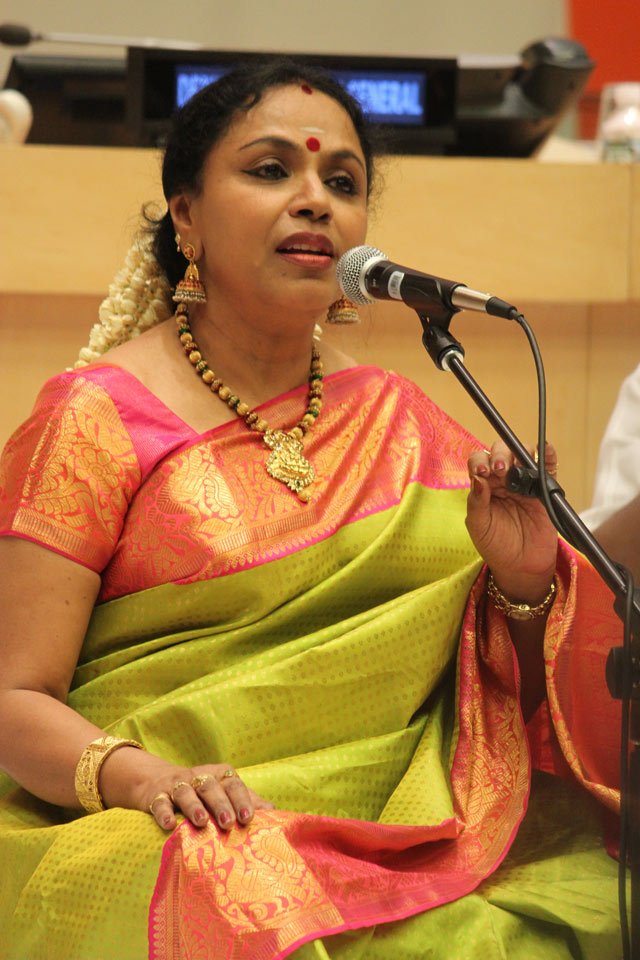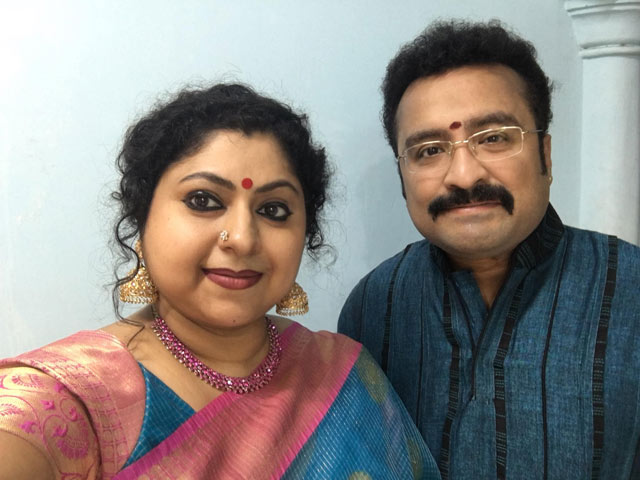
Vaishṇava jana to tene kahiye / jey peeḍh paraayee jaaṇe re/ Para dukhhe upakaar karey to ye / mana abhimaana na aaṇe rey
Such is a Vaishnav / who empathises with others' pain / and helps others in their misery / without boasting
Sakaḷa loka maaṁ sahune vande / nindaa naa kare keenī re / vaacha kaacha mann nischala raakhe / dhana dhana janani teni rey
Respectfully regarding the world / without denigrating anyone / upholding purity in words, actions and thoughts. / Blessed is the mother of such a soul
Sama-driṣhṭee ne trishna tyaagi / para-stree jene maata re / jihvaa thakee asatya na bole / para-dhana nava jhaale haath rey
Free of craving they see all alike / respect other women like they would their own mother / their tongues avoid falsehoods even under duress / they hands never covet others' wealth
Moha maayaa vyaape nahi jeney / driḍha-vairaagya jenaa manama rey,/ Rāma-naam shoo taaḷee rey laagee / sakaḷa tiratha tena tanamaa re
Without succumbing to material entrapments / they firmly detach from the mundane / when such a soul even utters God's name / All the piety of pilgrimage places manifest in it
Vaṇa-lobhee ney kapaṭa-rahit chhey / kaama krodh nivaaryaa re / Bhaṇey Narasaiyo tenu darshana kartaa / kuḷa eko tera taaryaa re
Completely forsaking greed-deceit / lust and anger doesn't touch them anymore/ Narsi says he will be beholden to meet such a soul / Whose virtue brings salvation to his entire lineage
This early 15th-century composition by Narsinh Mehta is only known across the country because of the Father of the Nation. Among his favourites for the core human values of peace, co-existence and harmony it extolls, it was often sung at the rallies and meetings across the country over 400 years after it was composed.
The Mahatma, whose pinch of salt shook up an empire, was not only about marches, rallies and standing up to the might of the British with non-violence, but also about nation-building through self-reliance (khadi, charkha) and spiritual upliftment. For the latter, he often found music, the best way to reach out to masses. In his own words: “Music does not proceed from the throat alone. There is the music of mind, of the senses and of the heart.” In fact, he often claimed both music and laughter saved him from “the crushing burden” of his work. His abiding belief in peaceful co-existence only made him more attracted to music. “In true music, there is no place for communal differences and hostility. Music was a great example of national integration because only there we see Hindu and Muslim musicians sitting together and partaking in musical concerts,” he said in Baroda on October 28th 1917 adding: “We consider music narrowly to mean the ability to sing and play an instrument well, but, in its wider sense, true music is created only when life is attuned to a single tune and a single time beat. Music is born only where the strings of the heart are not out of tune.”
Not surprising then that across genres, performers and composers have tried to use music to discover the Mahatma feels leading classical vocalist-composer Shubha Mudgal, who is presenting a special concert In Harmony With The Mahatma rendering poetry inspired by the life and principles of Gandhi along with percussionist-composer Dr Aneesh Pradhan. “The curation of this concert has been a work in progress for several years now,” she explains, “The more one understands and grasps the man and his thinking, the more one finds to respect and cherish. His almost brutal search for the truth makes you wonder about his courage. Today when we want to deny a lynching, despite video evidence, you have to give it to the man who openly admitted and spoke about his limitations and weaknesses with such candour.”

According to her, it is perhaps this aspect of Gandhi that made even those opposed to him not grudge him the respect. “My father Professor Skand Gupta was not always an admirer of Gandhi and quite critical of some of his views. And yet after he passed away I found a notebook in his handwriting with poems on Gandhi which he collected from anthologies.”
Known for the pearls of Sahitya she gets to her concerts, apart from the Gandhi poems her father had collected, she will present works by some of the biggest names from Hindi literature. “Whenever we want to evoke nationalism or patriotism to celebrate Gandhi why should it always be a marching song of aggression and might. Why can't it be tender, quiet and appeal to the heart?”
Citing the instance of Shivmangal Singh Suman's Mahaprayan and Mahanirvan she sang a line: “Hey pitah tumhine hum sabko gati dee / jeevan ka daan diya / hans hans swatntrata ke vedi par mitane ka abhiman diya” and added, “There are others like Bhavaiprasad Mishra who composed 13 poems to mark the 13 days of mourning since Gandhi was assassinated,” but admitted that she might include the Narsinh Mehta composition too.
Many feel the syncretic nature of music is what appealed to the Mahatma the most. He is on record to say, “We consider music in a narrow sense to mean the ability to sing and play an instrument well, but, in its wider sense, true music is created only when life is attuned to a single tune and a single time beat. Music is born only where the strings of the heart are not out of tune.”
In her essay in Gandhi in the New Millennium - Issues and Challenges, noted Gandhian scholar Dr Namrata Mishra insists true music was implicit in Khadi and the spinning wheel. “Mahatma Gandhi’s favourite raagas were Satya and Ahimsa. The Thaats he used were Swadeshi and Khadi. His vaadi (prominent) and samvaadi (second prominent) swaras were Brahmacharya and selflessness. Asatya and Himsa were varjit swaras (abandoned notes). He never missed his riyaaz with the charkha.”
Gwalior gharana doyenne Neela Bhagwat who has herself been performing in concerts themed on Gandhi – Mahatma - admits he takes a while to get used to but once you find a link you can be lost in it. “My recordist friend in Amsterdam took me to see the Gandhi statue (He is much respected by the dyke workers whose movement took inspiration from him) ironically situated in the Churchill Square. He'd brought flowers along to place at its feet. Something struck me there about my cynicism and ego in not understanding the Mahatma who the world took such pride in. As I kept my head at the feet of the statue I felt a sense of surrender and bliss.”
Her reading of Rajmohan Gandhi's The Good Boatman left her moved. She says his analysis of the Mahatma's personality, his objective yet compassionate approach helped her understand Gandhi. “I realised I'd internalised values he stood for, subconsciously. We, the generation that grew in independent India, have been socialised into the idea of protest, agitating for our rights, sharing whatever little we have with others, respecting any work however small, devoting yourself to whatever you do sincerely, a love for simple living and love for humanity irrespective of class, caste and religion is all a Gandhian influence.”

She calls Gandhi “the brave, unflinching hero of our freedom struggle,” and laments the “retrogressive denominational influence on Indian culture and politics during the last 25 years, which forces us to redefine ourselves,” which she says disturbs her to the core. She breaks into the only poem ever written by Gandhi 'Namrata Ke Sagar which she unfailingly sings at the concert. It also includes works of Marathi and Gujarati poets. Since its 2002 premiere in Amsterdam, it has been touring both in India and abroad.
Across the Vindhyas too, music and the Mahatma find a connect even in Carnatic music points Padmabhushan awardee Sudha Raghunathan who says it all began when Gandhi met the late Bharat Ratna MS Subbulakshmi and asked her to sing Hari Tum Haro.
“Initially hesitant, she went on to compose and sing it for him,” she says recalling with pride how she was invited to perform at the UN when it released a special stamp to honour the Carnatic legend M S Subbulakshmi October, 2nd 2016. “I sang a Sanskrit composition on Ahimsa and then a song on peace in Tamil at the UN. Though I'd given the audience a synopsis of what I was singing they seemed to connect with the music. I sang the Ram Dhun in the end and requested the audience to join in. Many did.”

She feels music is the best way of getting the message of Gandhi to reach across a large audience but admits including a Gandhian composition in every concert can be a challenge in Carnatic because all the compositions are already devotional in nature. “I nevertheless make it a point to include these in my concerts as and when the theme and context provides that space.”

Others like the Carnatic vocalist couple Dr Krishnakumar and his wife Binni (both disciples of the legend late Dr M Balamuraikrishna), echo her views and add, “The Mahatma is invoked in several the compositions of Subrahmanya Bharathi (Tamil), K C Kesava Pillai (Malayalam) among many others. This is how we are able to take this message of Gandhi across cultures, regions and more.”
Sometimes this can be across continents too. Like in Austin, US where the Carnatic musicians' views find an echo in Riyaaz Qawwali, an ensemble comprising artistes from India, Pakistan, Afghanistan, and Bangladesh, who represent multiple religions/spiritualities. Adept at both western and Hindustani classical genres, they have been performing qawwali for 11 years across the world. And yet it took a what the ensemble’s spokesperson Sonny calls “a low-quality video camera recording of their take on Vaishnav Jan Toh” uploaded on youtube in 2010 to go viral and change everything.
“The response was unbelievable. They way it brought people together. This piece is our most famous youtube release. Not only Hindus have since brought us in for concerts but its a requested piece by Muslim hosts and clients. For example, we're performing at an Eid banquet in California this weekend (Sept 2018). They've particularly requested Vaishnav Jan to be sung. Through the bhajan, we've seen Hindus and Muslims finding common ground. This is how music can achieve what words can't.”
The Getty Museum, Cummer Museum, The Menil Collection have all requested the ensemble to include this in the concerts they were invited to. “In these decisive times, such themes of non-violence and finding the truth are so important. When India is experiencing such political polarity, as is the US, a bit of focus on the basic tenets of humanity is needed,” and adds, “We want to harness our music for harmony and building bridges,” says Sonny. The ensemble has recorded both Vaishnav Jan Toh and Raghupati Raghav (in qawwali style) for their first album, Kashti.

He speaks of the resonances he finds in Gandhian thought and the poetry of Sufi mystics like Amir Khusro, Fariduddin Ganjshakar and even Bulleh Shah. A day after he spoke to this writer he was slated to give two lectures on qawwali at Harvard University. “I'll be using Vaishnav Jan Toh as a prime example to define qawwali and our work. To give this weight, the example has been vetted and approved by the foremost expert of qawwali, Dr Ali Asani Professor of Indo-Muslim and Islamic Religion and Cultures at Harvard.”
This musical discovery of the Mahatma makes it seems like Albert Einstein was right in what he said about Gandhi. “Generations to come will scarce believe that such a one as this ever in flesh and blood walked upon this earth.”